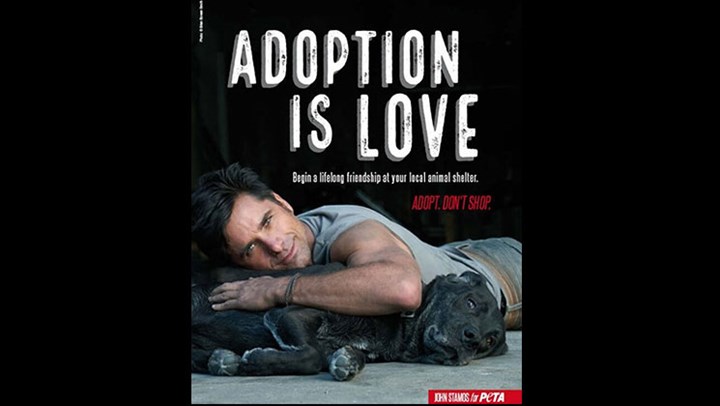
by Frank Miniter - Friday, March 16, 2018

People for the Ethical Treatment of Animals (PETA) has these lovely, soft and cuddly ads. A recent example shows actor John Stamos laying down with his left cheek and arm resting on an old dog, gray on its muzzle. “Adoption is Love” declares the ad over the sentence: “Begin a lifelong friendship at your local animal shelter.”
The trouble for this dog is, if it was in PETA’s shelter, it was likely euthanized by PETA moments after the photo was taken.
PETA kills so many animals (80 to 90 percent of the animals it takes in per year) that Virginia lawmakers passed a bill in 2015, by an almost unanimous vote, to force private animal shelters to primarily focus on finding homes for animals, rather than to simply kill them. Legislators said this legislation was pointed right at PETA.
Yes, that PETA. The same group that doesn’t want you to hunt, fish or enjoy a Thanksgiving turkey. The same PETA that holds stunts with naked women who are painted to look like animals as they sit in cages on city streets. The same group that thinks we should all be forced to go vegan.
The trouble for PETA is its leaders have run into a sliver of reality they can’t avoid. If they’re going to have an animal shelter—and, therefore, are going to take in abused animals or just puppies and kittens—then they’re going to have to euthanize some of them. Some will be sick, diseased or dangerous. There also just aren’t enough homes for all of them.
The state of Virginia—the same state where PETA’s shelter is located—euthanizes about a quarter of the animals in its shelters each year. This should make anyone wonder why PETA kills 80 percent or more of the animals it takes in each year.
PETA has tried to explain its action.
PETA says, “The word ‘euthanasia’ comes from two Greek words—‘eu’ meaning ‘good’ and ‘thanatos’ meaning ‘death.’ Euthanasia is defined as a merciful release from life in order to end suffering. How can anyone fail to recognize that there is a world of difference between painlessly euthanizing animals—the aged, injured, sick and dying, whose guardians can’t afford euthanasia, for instance—out of compassion, as PETA does, and causing them terror, pain and a prolonged death by leaving them to struggle to survive on the streets, at the hands of untrained and uncaring ‘technicians,’ or animal abusers?”
Surely, this is the hardest thing any government or private shelter must come to terms with, but again, why is PETA killing such a high percentage? Has it found it’s simply cheaper to kill the animals? Is it, as has been reported, actually opposed to people owning pets?
PETA is officially opposed to “speciesism,” which is defined as understanding that humans have different values or rights than animals. PETA thinks speciesism is a prejudice similar to racism or sexism. PETA’s founder and president, Ingrid Newkirk, once said, “When it comes to feelings like hunger, pain, and thirst, a rat is a pig is a dog is a boy.”
Still, PETA understands it’s not financially advantageous for it to be this far out of the mainstream—and out of basic logical reasoning—so it runs ads, as the Humane Society of the United States does, pretending it is simply a group that cares. The group’s warm and cuddly marketing campaign brings in donations from well-meaning people across the United States.
It is a shame that a little more reality hasn’t made its way into PETA’s heart. PETA isn’t against killing. No, it has learned it must kill, and it actually seems to take too much pleasure in euthanizing. Why then is it opposed to hunting? Of course, because PETA leaders think they can love wild animals from a distance with no accountability for the farmers’ crops, even the very ones raising organic vegetables for their vegan lifestyle. They refuse to think, read the studies, and talk to wildlife biologists and more to understand that when deer overpopulate they become diseased and starve, or that when deer over-browse a forest the entire ecosystem suffers.
PETA finds it easy to ignore the blood on their lettuce. It just can’t publicly acknowledge that farmers must protect their crops from insects and wildlife.
PETA thinks it is on some high road, somewhere above reality and even nature itself, as it judges the rest of us.
That might be a happy delusion, but the rest of us need to call them out on it, as wildlife policies need to be founded on scientifically sound, practical realities.
People for the Ethical Treatment of Animals should understand that real ethical treatment of ourselves and animals means we must open our minds and our hearts to doing what’s best for the natural world and our important role in it.
It isn’t that PETA’s ad is dishonest (we should adopt pets from shelters when we can); no, it’s that PETA itself is deeply dishonest. So dishonest, in fact, that if its desires became public policy they would do great harm to animals and us.
■ ■ ■
Editor's Note: Frank Miniter is the author of "This Will Make a Man of You: One Man’s Search for Hemingway and Manhood in a Changing World." Miniter is also the author of the New York Times' Bestseller "The Ultimate Man’s Survival Guide," as well as "The Future of the Gun" and “The Politically Incorrect Guide to Hunting.”
E-mail your comments/questions about this site to:
[email protected]
